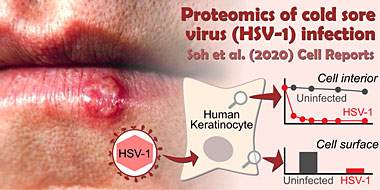Herpes simplex virus (HSV) infects approximately two-thirds of the world’s population, causing cold sores or genital herpes that re-occur sporadically throughout people’s lives. When HSV re-activates it dramatically re-organises infected cells in order to turn them into highly efficient virus-producing factories.

The research groups of Colin Crump and Stephen Graham in the Department of Pathology have collaborated with the group of Michael Weekes in the Cambridge Institute for Medical Research to define the changes in protein abundance that accompany HSV infection. Specifically, they used advanced mass spectrometry techniques to show that HSV modifies the abundance of thousands of different proteins within infected cells. This work, recently published in Cell Reports, provides a treasure-trove of information for researchers around the world about the interactions between HSV and its human host cells. It also has uncovered a new way in which HSV changes the proteins on the surface of cells to help the virus hide from the immune system.
https://www.cell.com/cell-reports/fulltext/S2211-1247(20)31224-9
This research was funded by the BBSRC, Wellcome Trust and Royal Society

